- Home
- Raymond Chandler
The Big Sleep pm-1 Page 12
The Big Sleep pm-1 Read online
Page 12
"Sure." I stood up and we shook hands.
"Maybe I can do you a real favor some day," he said. "You got it all from Gregory this time."
"So you own a piece of him too."
"Oh not that bad. We're just friends."
I stared at him for a moment, then went over to the door I had come in at. I looked back at him when I had it open.
"You don't have anybody tailing me around in a gray Plymouth sedan, do you?"
His eyes widened sharply. He looked jarred. "Hell, no. Why should I?"
"I couldn't imagine," I said, and went on out. I thought his surprise looked genuine enough to be believed. I thought he even looked a little worried. I couldn't think of any reason for that.
22
It was about ten-thirty when the little yellow-sashed Mexican orchestra got tired of playing a low-voiced, prettied-up rhumba that nobody was dancing to. The gourd player rubbed his finger tips together as if they were sore and got a cigarette into his mouth almost with the same movement. The other four, with a timed simultaneous stoop, reached under their chairs for glasses from which they sipped, smacking their lips and flashing their eyes. Tequila, their manner said. It was probably mineral water. The pretense was as wasted as the music. Nobody was looking at them.
The room had been a ballroom once and Eddie Mars had changed it only as much as his business compelled him. No chromium glitter, no indirect lighting from behind angular cornices, no fused glass pictures, or chairs in violent leather and polished metal tubing, none of the pseudomodernistic circus of the typical Hollywood night trap. The light was from heavy crystal chandeliers and the rose-damask panels of the wall were still the same rose damask, a little faded by time and darkened by dust, that had been matched long ago against the parquetry floor, of which only a small glass-smooth space in front of the little Mexican orchestra showed bare. The rest was covered by a heavy old-rose carpeting that must have cost plenty. The parquetry was made of a dozen kinds of hardwood, from Burma teak through half a dozen shades of oak and ruddy wood that looked like mahogany, and fading out to the hard pale wild lilac of the California hills, all laid in elaborate patterns, with the accuracy of a transit.
It was still a beautiful room and now there was roulette in it instead of measured, old-fashioned dancing. There were three tables close to the far wall. A low bronze railing joined them and made a fence around the croupiers. All three tables were working, but the crowd was at the middle one. I could see Vivian Regan's black head close to it, from across the room where I was leaning against the bar and turning a small glass of bacardi around on the mahogany.
The bartender leaned beside me watching the cluster of well-dressed people at the middle table. "She's pickin' 'em tonight, right on the nose," he said. "That tall blackheaded frail."
"Who is she?"
"I wouldn't know her name. She comes here a lot though."
"The hell you wouldn't know her name."
"I just work here, mister," he said without any animosity. "She's all alone too. The guy was with her passed out. They took him out to his car."
"I'll take her home," I said.
"The hell you will. Well, I wish you luck anyways. Should I gentle up that bacardi or do you like it the way it is?"
"I like it the way it is as well as I like it at all," I said.
"Me, I'd just as leave drink croup medicine," he said.
The crowd parted and two men in evening clothes pushed their way out and I saw the back of her neck and her bare shoulders in the opening. She wore a lowcut dress of dull green velvet. It looked too dressy for the occasion. The crowd closed and hid all but her black head. The two men came across the room and leaned against the bar and asked for Scotch and soda. One of them was flushed and excited. He was mopping his face with a black-bordered handkerchief. The double satin stripes down the side of his trousers were wide enough for tire tracks.
"Boy, I never saw such a run," he said in a jittery voice. "Eight wins and two stand-offs in a row on that red. That's roulette, boy, that's roulette."
"It gives me the itch," the other one said. "She's betting a grand at a crack. She can't lose." They put their beaks in their drinks, gurgled swiftly and went back.
"So wise the little men are," the barkeep drawled. "A grand a crack, huh. I saw an old horseface in Havana once — "
The noise swelled over at the middle table and a chiseled foreign voice rose above it saying: "If you will just be patient a moment, madam. The table cannot cover your bet. Mr. Mars will be here in a moment."
I left my bacardi and padded across the carpet. The little orchestra started to play a tango, rather loud. No one was dancing or intending to dance. I moved through a scattering of people in dinner clothes and full evening dress and sports clothes and business suits to the end table at the left. It had gone dead. Two croupiers stood behind it with their heads together and their eyes sideways. One moved a rake back and forth aimlessly over the empty layout. They were both staring at Vivian Regan.
Her long lashes twitched and her face looked unnaturally white. She was at the middle table, exactly opposite the wheel. There was a disordered pile of money and chips in front of her. It looked like a lot of money. She spoke to the croupier with a cool, insolent, ill-tempered drawl.
"What kind of a cheap outfit is this, I'd like to know. Get busy and spin that wheel, highpockets. I want one more play and I'm playing table stakes. You take it away fast enough I've noticed, but when it comes to dishing it out you start to whine."
The croupier smiled a cold polite smile that had looked at thousands of boors and millions of fools. His tall dark disinterested manner was flawless. He said gravely: "The table cannot cover your bet, madam. You have over sixteen thousand dollars there."
"It's your money," the girl jeered. "Don't you want it back?"
A man beside her tried to tell her something. She turned swiftly and spat something at him and he faded back into the crowd red-faced. A door opened in the paneling at the far end of the enclosed place made by the bronze railing. Eddie Mars came through the door with a set indifferent smile on his face, his hands thrust into the pockets of his dinner jacket, both thumbnails glistening outside. He seemed to like that pose. He strolled behind the croupiers and stopped at the corner of the middle table. He spoke with lazy calm, less politely than the croupier.
"Something the matter, Mrs. Regan?"
She turned her face to him with a sort of lunge. I saw the curve of her cheek stiffen, as if with an almost unbearable inner tautness. She didn't answer him.
Eddie Mars said gravely: "If you're not playing any more, you must let me send someone home with you."
The girl flushed. Her cheekbones stood out white in her face. Then she laughed off-key. She said bitterly:
"One more play, Eddie. Everything I have on the red. I like red. It's the color of blood."
Eddie Mars smiled faintly, then nodded and reached into his inner breast pocket. He drew out a large pinseal wallet with gold corners and tossed it carelessly along the table to the croupier. "Cover her bet in even thousands," he said, "if no one objects to this turn of the wheel being just for the lady."
No one objected, Vivian Regan leaned down and pushed all her winnings savagely with both hands on to the large red diamond on the layout.
The croupier leaned over the table without haste. He counted and stacked her money and chips, placed all but a few chips and bills in a neat pile and pushed the rest back off the layout with his rake. He opened Eddie Mars' wallet and drew out two flat packets of thousand-dollar bills. He broke one, counted six bills out, added them to the unbroken packet, put the four loose bills in the wallet and laid it aside as carelessly as if it had been a packet of matches. Eddie Mars didn't touch the wallet. Nobody moved except the croupier. He spun the wheel lefthanded and sent the ivory ball skittering along the upper edge with a casual flirt of his wrist. Then he drew his hands back and folded his arms.
Vivian's lips parted slowly until her teeth caugh
t the light and glittered like knives. The ball drifted lazily down the slope of the wheel and bounced on the chromium ridges above the numbers. After a long time and then very suddenly motion left it with a dry click. The wheel slowed, carrying the ball around with it. The croupier didn't unfold his arms until the wheel had entirely ceased to revolve.
"The red wins," he said formally, without interest. The little ivory ball lay in Red 25, the third number from the Double Zero. Vivian Regan put her head back and laughed triumphantly.
The croupier lifted his rake and slowly pushed the stack of thousand-dollar bills across the layout, added them to the stake, pushed everything slowly out of the field of play.
Eddie Mars smiled, put his wallet back in his pocket, turned on his heel and left the room through the door in the paneling.
A dozen people let their breath out at the same time and broke for the bar. I broke with them and got to the far end of the room before Vivian had gathered up her winnings and turned away from the table. I went into the large quiet lobby, got my hat and coat from the check girl, dropped a quarter in her tray and went out on the porch. The doorman loomed up beside me and said: "Can I get your car for you, sir?"
I said: "I'm just going for a walk."
The scrollwork along the edge of the porch was wet with the fog. The fog dripped from the Monterey cypresses that shadowed off into nothing towards the cliff above the ocean. You could see a scant dozen feet in any direction. I went down the porch steps and drifted off through the trees, following an indistinct path until I could hear the wash of the surf licking at the fog, low down at the bottom of the cliff. There wasn't a gleam of light anywhere. I could see a dozen trees clearly at one time, another dozen dimly, then nothing at all but the fog. I circled to the left and drifted back towards the gravel path that went around to the stables where they parked the cars. When I could make out the outlines of the house I stopped. A little in front of me I had heard a man cough.
My steps hadn't made any sound on the soft moist turf. The man coughed again, then stifled the cough with a handkerchief or a sleeve. While he was still doing that I moved forward closer to him. I made him out, a vague shadow close to the path. Something made me step behind a tree and crouch down. The man turned his head. His face should have been a white blur when he did that. It wasn't. It remained dark. There was a mask over it.
I waited, behind the tree.
23
Light steps, the steps of a woman, came along the invisible pathway and the man in front of me moved forward and seemed to lean against the fog. I couldn't see the woman, then I could see her indistinctly. The arrogant carriage of her head seemed familiar. The man stepped out very quickly. The two figures blended in the fog, seemed to be part of the fog. There was dead silence for a moment. Then the man said:
"This is a gun, lady. Gentle now. Sound carries in the fog. Just hand me the bag."
The girl didn't make a sound. I moved forward a step. Quite suddenly I could see the foggy fuzz on the man's hat brim. The girl stood motionless. Then her breathing began to make a rasping sound, like a small file on soft wood.
"Yell," the man said, "and I'll cut you in half."
She didn't yell. She didn't move. There was a movement from him, and a dry chuckle. "It better be in here," he said. A catch clicked and a fumbling sound came to me. The man turned and came towards my tree. When he had taken three or four steps he chuckled again. The chuckle was something out of my own memories. I reached a pipe out of my pocket and held it like a gun.
I called out softly: "Hi, Lanny."
The man stopped dead and started to bring his hand up. I said: "No. I told you never to do that, Lanny. You're covered."
Nothing moved. The girl back on the path didn't move. I didn't move. Lanny didn't move.
"Put the bag down between your feet, kid," I told him. "Slow and easy."
He bent down. I jumped out and reached him still bent over. He straightened up against me breathing hard. His hands were empty.
"Tell me I can't get away with it," I said. I leaned against him and took the gun out of his overcoat pocket. "Somebody's always giving me guns," I told him. "I'm weighted down with them till I walk all crooked. Beat it."
Our breaths met and mingled, our eyes were like the eyes of two tomcats on a wall. I stepped back.
"On your way, Lanny. No hard feelings. You keep it quiet and I keep it quiet. Okey?"
"Okey," he said thickly.
The fog swallowed him. The faint sound of his steps and then nothing. I picked the bag up and felt in it and went towards the path. She still stood there motionless, a gray fur coat held tight around her throat with an ungloved hand on which a ring made a faint glitter. She wore no hat. Her dark parted hair was part of the darkness of the night. Her eyes too.
"Nice work, Marlowe. Are you my bodyguard now?" Her voice had a harsh note.
"Looks that way. Here's the bag."
She took it. I said: "Have you a car with you?"
She laughed. "I came with a man. What are you doing here?"
"Eddie Mars wanted to see me."
"I didn't know you knew him. Why?"
"I don't mind telling you. He thought I was looking for somebody he thought had run away with his wife."
"Were you?"
"No."
"Then what did you come for?"
"To find out why he thought I was looking for somebody he thought had run away with his wife."
"Did you find out?"
"No."
"You leak information like a radio announcer," she said. "I suppose it's none of my business — even if the man was my husband. I thought you weren't interested in that."
"People keep throwing it at me."
She clicked her teeth in annoyance. The incident of the masked man with the gun seemed to have made no impression on her at all. "Well, take me to the garage," she said. "I have to look in at my escort."
We walked along the path and around a corner of the building and there was light ahead, then around another corner and came to a bright enclosed stable yard lit with two floodlights. It was still paved with brick and still sloped down to a grating in the middle. Cars glistened and a man in a brown smock got up off a stool and came forward.
"Is my boy friend still blotto?" Vivian asked him carelessly.
"I'm afraid he is, miss. I put a rug over him and run the windows up. He's okey, I guess. Just kind of resting."
We went over to a big Cadillac and the man in the smock pulled the rear door open. On the wide back seat, loosely arranged, covered to the chin with a plaid robe, a man lay snoring with his mouth open. He seemed to be a big blond man who would hold a lot of liquor.
"Meet Mr. Larry Cobb," Vivian said. "Mister Cobb — Mister Marlowe."
"Mr. Cobb was my escort," she said. "Such a nice escort, Mr. Cobb. So attentive. You should see him sober. I should see him sober. Somebody should him sober. I mean, just for the record. So it could become a part of history, that brief flashing moment, soon buried in time, but never forgotten — when Larry Cobb was sober."
"Yeah," I said.
"I've even thought of marrying him," she went on a high strained voice, as if the shock of the stickip was just beginning to get to her. "At odd times when nothing pleasant would come into my mind. We all have those spells. Lots of money, you know. A yacht, a place on Long Island, a place at Newport, a place at Bermuda, places dotted here and there all ever the world probably — just a good Scotch bottle apart. And to Mr. Cobb a bottle of Scotch is not very far."
"Yeah," I said. "Does he have a driver to take him home?"
"Don't say 'yeah.' It's common." She looked at me with arched eyebrows. The man in the smock was chewing his lower lip hard. "Oh, undoubtedly a whole platoon of drivers. They probably do squads right in front of the garage every morning, buttons shining, harness gleaming, white gloves immaculate — a sort of West Point elegance about them."
"Well, where the hell is this driver?" I asked.
"He
drove hisself tonight," the man in the smock said, almost apologetically. "I could call his home and have somebody come down for him."
Vivian turned around and smiled at him as if he had just presented her with a diamond tiara. "That would be lovely," she said. "Would you do that? I really wouldn't want Mr. Cobb to die like that — with his mouth open. Someone might think he had died of thirst."
The man in the smock said: "Not if they sniffed him, miss."
She opened her bag and grabbed a handful of paper money and pushed it at him. "You'll take care of him, I'm sure."
"Jeeze," the man said, pop-eyed. "I sure will, miss."
"Regan is the name," she said sweetly. "Mrs. Regan. You'll probably see me again. Haven't been here long, have you?"
"No'm. His hands were doing frantic things with the fistful of money he was holding.
"You'll get to love it here," she said. She took hold of my arm. "Let's ride in your car, Marlowe."
"It's outside on the street."
"Quite all right with me, Marlowe. I love a nice walk in the fog. You meet such interesting people."
"Oh, nuts," I said.
She held on to my arm and began to shake. She held me hard all the way to the car. She had stopped shaking by the time we reached it. I drove down a curving lane of trees on the blind side of the house. The lane opened on De Cazens Boulevard, the main drag of Las Olindas. We passed under the ancient sputtering arc lights and after a while there was a town, buildings, dead-looking stores, a service station with a light over a nightbell, and at last a drugstore that was still open.
"You better have a drink," I said.
She moved her chin, a point of paleness in the corner of the seat. I turned diagonally into the curb and parked. "A little black coffee and a smattering of rye would go well," I said.
"I could get as drunk as two sailors and love it."
I held the door for her and she got out close to me, brushing my cheek with her hair. We went into the drugstore. I bought a pint of rye at the liquor counter and carried it over to the stools and set it down on the cracked marble counter.

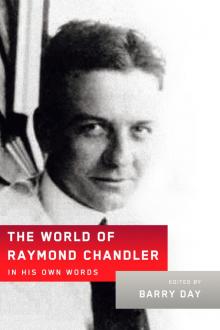 The World of Raymond Chandler: In His Own Words
The World of Raymond Chandler: In His Own Words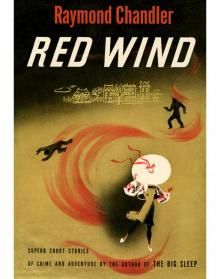 Red Wind: A Collection of Short Stories
Red Wind: A Collection of Short Stories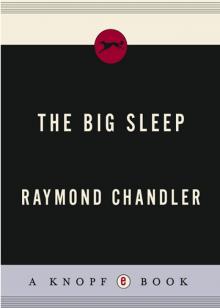 The Big Sleep
The Big Sleep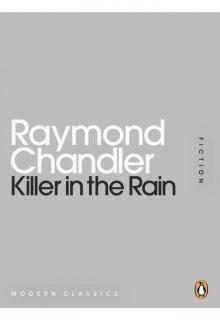 Killer in the Rain
Killer in the Rain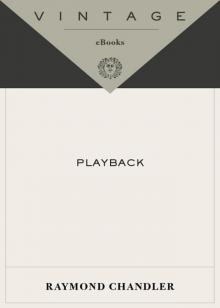 Playback
Playback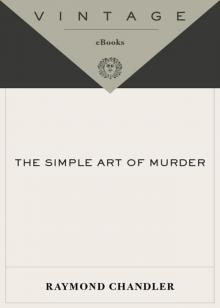 The Simple Art of Murder
The Simple Art of Murder The Bronze Door
The Bronze Door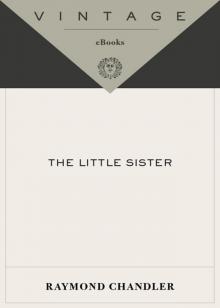 The Little Sister
The Little Sister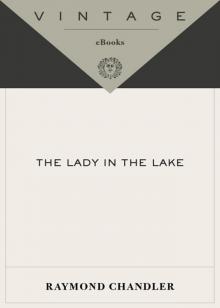 The Lady in the Lake
The Lady in the Lake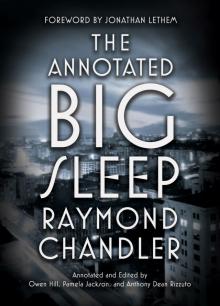 The Annotated Big Sleep
The Annotated Big Sleep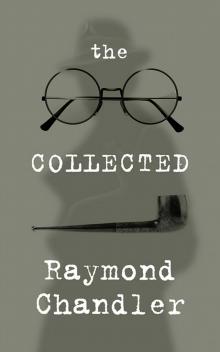 The Collected Raymond Chandler
The Collected Raymond Chandler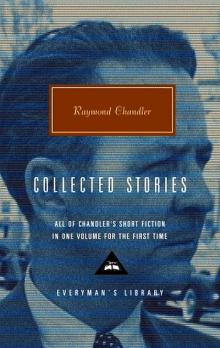 Collected Stories (Everyman's Library)
Collected Stories (Everyman's Library)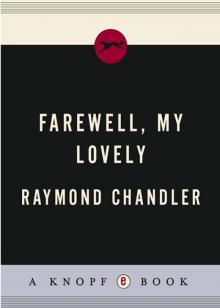 Farewell, My Lovely
Farewell, My Lovely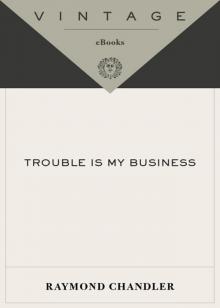 Trouble Is My Business
Trouble Is My Business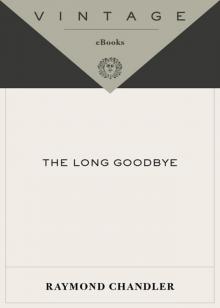 The Long Goodbye
The Long Goodbye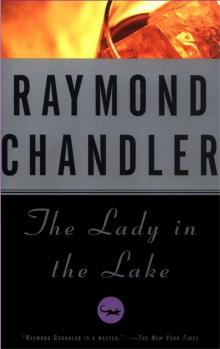 The Lady in the Lake pm-4
The Lady in the Lake pm-4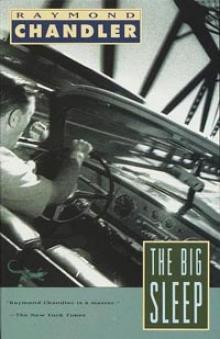 The Big Sleep pm-1
The Big Sleep pm-1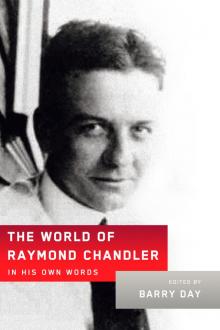 The World of Raymond Chandler
The World of Raymond Chandler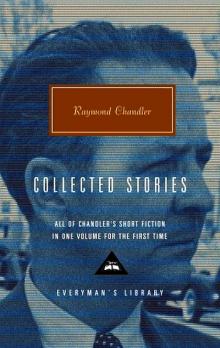 Collected Stories of Raymond Chandler
Collected Stories of Raymond Chandler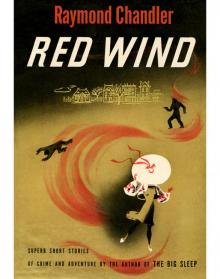 Red Wind
Red Wind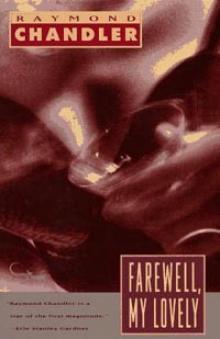 Farewell, My Lovely pm-2
Farewell, My Lovely pm-2 The Raymond Chandler Papers: Selected Letters and Nonfiction, 1909–1959
The Raymond Chandler Papers: Selected Letters and Nonfiction, 1909–1959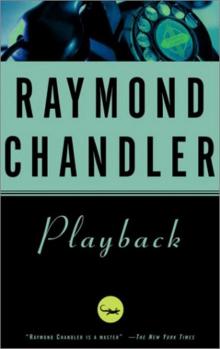 Playback pm-7
Playback pm-7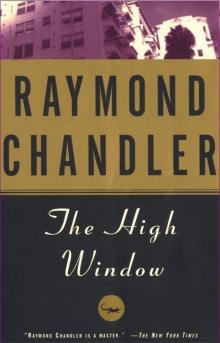 The High Window pm-3
The High Window pm-3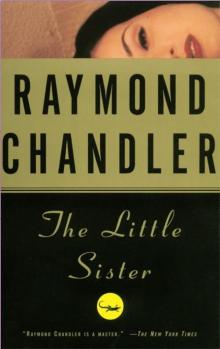 The Little Sister pm-5
The Little Sister pm-5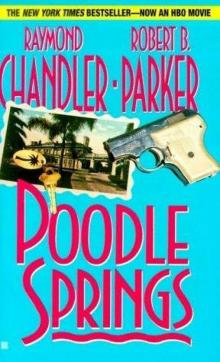 Poodle Springs (philip marlowe)
Poodle Springs (philip marlowe)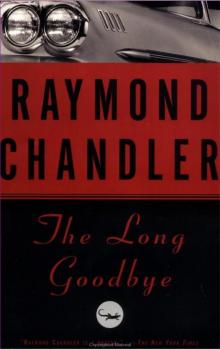 The Long Goodbye pm-6
The Long Goodbye pm-6